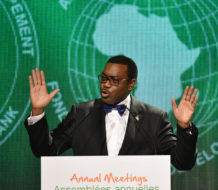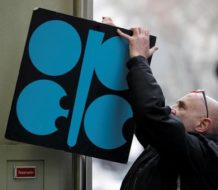ABUJA (Reuters) – Nigeria’s central bank unexpectedly raised the benchmark interest rate to 12 percent from 11 percent on Tuesday, changing gears to curb galloping inflation after cutting the rate only four months ago.
The bank also raised the cash reserve ratio (CRR) for commercial banks to 22.5 percent from 20 percent and it held the liquidity ratio at 30 percent, Governor Godwin Emefiele said.
Emefiele said after a meeting of its monetary policy committee that the central bank would keep the naira foreign exchange rate stable despite a sharp fall of the currency on the parallel market due to shortages of dollars.
Africa’s biggest economy is going through its worst economic crisis in years due to a slump in crude prices. Oil exports account for around 70 percent of national income.
Emefiele attributed the rate hike to the state of the economy and rising annual inflation, which hit 11.4 percent in February, a three-and-a-half year high and well above the central bank’s target band of 6 to 9 percent.
“The committee noted that excess liquidity in the banking system was contributing to the current pressure in the foreign exchange market with a strong path through to consumer prices,” he told reporters.
But some analysts saw the tightening of monetary policies as a signal that the bank would devalue the naira eventually. The currency has fallen some 40 percent on the parallel market as import firms struggle to get dollars from official channels.
“This definitely reflects a departure from policy in recent months and we interpret this as a leading indicator for a possible naira devaluation later down the line,” said Cobus de Hart, analyst at NKC African Economics.
“This may signal that the central bank is starting to lean towards tightening policy in anticipation of higher inflation following a devaluation,” he said.
WEAK INVESTOR CONFIDENCE
Eighteen of 20 analysts polled by Reuters had expected the central bank to hold interest rates steady at 11 percent.
Alan Cameron, an economist at brokerage Exotix, said the central bank had raised the benchmark rate as the previous loosening of monetary policy had not given a fillip to the economy.
“I think there is a realisation the liquidity they have been injecting wasn’t turning into overall lending in the economy because the confidence is not very high, so it made sense to withdraw that.”
Emefiele also called for swift approval of the 2016 budget, which on Tuesday was put on the agenda of the upper house of parliament for debate.
(By Camillus Eboh. Reporting by Ulf Laessing, Alexis Akwagyiram, Chijioke Ohuoha and Oludare Mayowa; Writing by Alexis Akwagyiram and Ulf Laessing; Editing by Gareth Jones)




